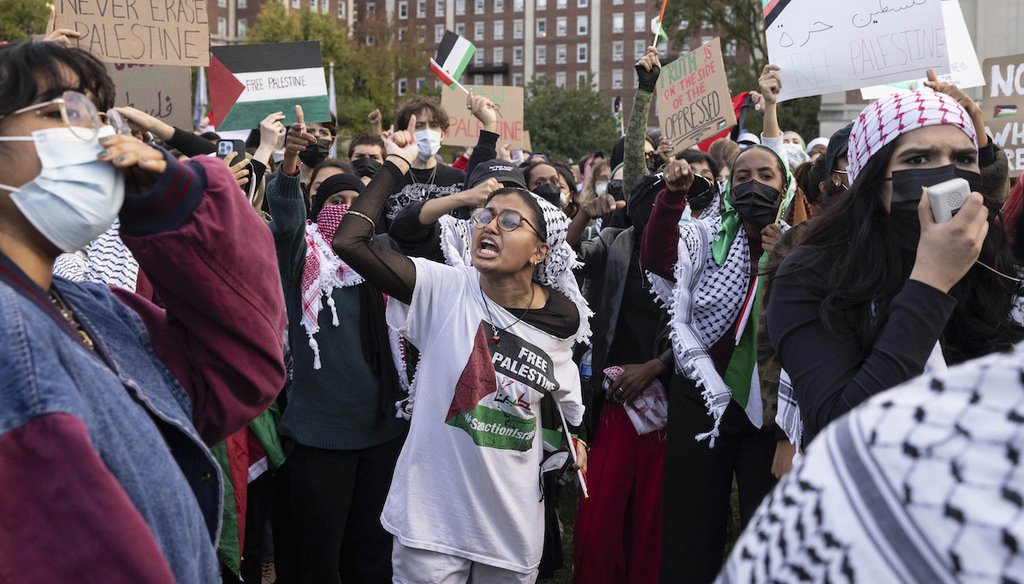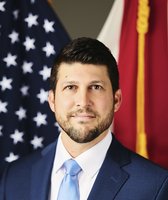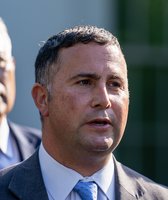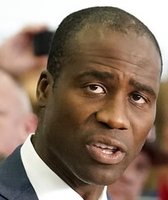Stand up for the facts!
Our only agenda is to publish the truth so you can be an informed participant in democracy.
We need your help.
I would like to contribute

Palestinian supporters gather for a protest at Columbia University on Oct. 12, 2023, in New York. (AP)
If a student group voices support for a foreign terrorist organization, is it breaking the law?
That’s what Gov. Ron DeSantis argued after Florida banned Students for Justice in Palestine from operating chapters on the state’s college campuses.
"You have a right to go out and demonstrate, but you can't provide material support to terrorism," DeSantis said Oct. 29 on NBC’s "Meet the Press." "They've linked themselves to Hamas. And so, we absolutely decertify them. They should not get one red cent of taxpayer dollars."
DeSantis said it’s "not a First Amendment issue," because of the state’s laws on terrorism and fundraising.
Host Kristen Welker clarified that DeSantis was citing the Florida law that says people cannot give material aid or resources to a terrorist organization. "Do you have any support that they're actually doing that?" she asked.
DeSantis responded that, "in their own words," they’re part of the Hamas organization. He was referring to a statement by the group’s national body after Hamas’ surprise Oct. 7 assault on Israel.
The U.S. State Department designated Hamas, an armed Palestinian militant group, as terrorists in 1997. The European Union and other Western countries also deem Hamas a terrorist organization.
Legal experts were dubious of DeSantis’ argument that written or vocal support for Hamas’ actions in Israel amounts to a violation of Florida’s anti-terrorism laws.
PolitiFact wanted to learn more about what the group said, how it could relate to Florida law and what legal precedent could inform the debate.
What the group said
On Oct. 12, five days after the Hamas attacks, Students for Justice in Palestine compiled a "Day of Resistance toolkit" with advice and tips campus chapters could use to host protests in support of Palestinians.
The toolkit referred to Hamas’ attack on Israel as "the resistance" and, in a section about framing discussions about the conflict, stated that "Palestinian students in exile are PART of this movement, not in solidarity with this movement."
"This is a moment of mobilization for all Palestinians. We must act as part of this movement. All of our efforts continue the work and resistance of Palestinians on the ground," it said.
This language spurred DeSantis to close chapters of the group on university campuses. This affected chapters at the University of Florida and the University of South Florida.
"It is a felony under Florida law to ‘knowingly provide material support … to a designated foreign terrorist organization," State University System Chancellor Ray Rodrigues wrote in an Oct. 24 letter to state university presidents, citing the national group’s toolkit.
Students for Justice in Palestine violated Florida law when it "affirmatively identified it is part of the Operation Al-Aqsa Flood — a terrorist led attack," Rodrigues wrote.
The "deactivation" leaves room for the two chapters to form another organization decoupled from the national group.
Members of the University of Florida’s Students for Justice in Palestine chapter called the order "disgraceful."
"Governor DeSantis continues to disrespect American values such as freedom of speech to extend his political power. To bend the law in this manner shows the utmost disrespect not only to any pro-Palestinian organization, but also to anyone who truly cares for political freedom and freedom of speech," members wrote in a statement.
The University of South Florida’s chapter had not released a statement.
What the Florida terrorism law says
The Florida statute in question, 775.3, says that any person who provides "material support or resources" to a foreign terrorist group or who "attempts or conspires to do so" is committing a first-degree felony.
The statute offers a broad definition for "material support or resources." It includes "any property, tangible or intangible, or service, including currency or monetary instruments or financial securities, financial services, lodging, training, expert advice or assistance, safe houses, false documentation or identification, communications equipment, facilities, weapons, lethal substances, explosives, personnel or transportation."
How experts say it could infringe on First Amendment rights
First Amendment and constitutional law experts said that absent more evidence of unlawful intent or direct interaction with Hamas, the statute doesn’t appear to apply to Students for Justice in Palestine’s statement.
"If the only reason to deactivate the SJP organization was based on the organization’s public statements supporting Hamas, then the state has engaged in content- and viewpoint-based discrimination against the student group," Jane Bambauer, a University of Florida law professor, wrote in an email. "The material support statute does not and cannot convert what would otherwise constitute protected speech into unprotected conduct unless the statements are part of a coordinated campaign with a terrorist organization."
Bambauer said the statements looked crafted to distance the national group from Hamas by emphasizing that the student organization is part of a larger movement.
The national organization did not respond to a request for comment.
Lyrissa Lidsky, the Raymond & Miriam Ehrlich Chair in U.S. Constitutional Law at the University of Florida, argued for free speech in a column for The Independent Alligator, the student newspaper.
"Universities cannot exclude student groups from the forums they have established simply because the universities find the students’ speech distasteful. Indeed, a core principle of the First Amendment is that government actors may not ban speech simply because the speech is offensive, hateful or even because it advocates violence," Lidsky wrote.
She pointed out that the U.S. Supreme Court addressed this in the 2010 case Holder v. Humanitarian Law Project. The nonprofit organization wanted to train designated terrorist groups about international law and negotiation strategy to help them use peaceful and lawful means to resolve grievances, she wrote.
A federal statute after which the Florida law is modeled defined material support for terrorism to include such training. The nonprofit challenged the law on First Amendment grounds, and the Supreme Court ruled in the group’s favor.
The court held that the First Amendment allowed the federal government to criminalize such training if it was "coordinated with, or at the direction of" a foreign terrorist organization, but the terrorism law didn’t prohibit independent advocacy or expression about terrorist groups.
"In other words," Lidsky wrote, "the court drew an important distinction between independently spreading propaganda supporting a terrorist group and coordinating with a terrorist group to help it get its message out."
Brian Hauss, senior staff attorney for ACLU’s Speech, Privacy and Technology Project, told us that the First Amendment also prohibits DeSantis from disbanding, or otherwise punishing, local chapters merely because of their affiliation with the national chapter.
"The Supreme Court held in Healy v. James that student groups cannot be censored merely because of their affiliation with disfavored organizations," Hauss wrote in an email.
Jonathan Greenblatt, CEO of the Anti-Defamation League, a nonprofit that fights antisemitism, told Inside Higher Ed there could be a separate obstacle for such groups, however: Title VI of the Civil Rights Act of 1964. He said universities that allow speech that embodies support for terrorist organizations could violate that law, which prohibits discrimination based on race, color or national origin.
Our Sources
NBC News, "Meet the Press" - October 29, 2023
C-SPAN, Presidential Candidates Speak at Republican Jewish Coalition Conference, Oct. 28, 2023
Florida Legislature, 775.33 Providing material support or resources for terrorism or to terrorist organizations, Accessed Oct. 30, 2023
State University System of Florida, Deactivation of National Students for Justice in Palestine, Oct. 24, 2023
Cornell Law School, 18 U.S. Code § 2339A - Providing material support to terrorists
Florida Politics, Legal experts say efforts likely illegal under Gov. DeSantis to shut down pro-Palestinian college groups, Oct. 27, 2023
The Fire, Statement on orders to Florida public universities to derecognize Students for Justice in Palestine: We must not give politicians more power to suppress our free speech, Oct. 25, 2023
USF Oracle, Florida orders pro-Palestinian USF group to disband, Oct. 25, 2023
The Alligator, DeSantis administration demands deactivation of pro-Palestinian university student chapters, Oct. 24, 2023
The Alligator, Campus speech matters: The First Amendment and student organizations, Oct. 30, 2023
Inside HigherEd, Florida Bans Students for Justice in Palestine on Some Campuses, Oct. 26, 2023
Email interview, Lyrissa Lidsky, the Raymond & Miriam Ehrlich Chair in U.S. Constitutional Law at the University of Florida’s Levin College of Law, Oct. 31, 2023
Email interview, Jane Bambauer, professor at the University of Florida’s Levin College of Law, Oct. 31, 2023
Email interview, Jeremy Redfern Governor Ron DeSantis press office, Oct. 31, 2023
Email interview, Brian Hauss, senior staff attorney for ACLU’s Speech, Privacy and Technology Project, Oct. 31, 2023






































